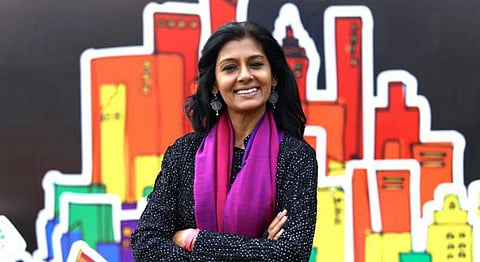
- #HGCREATORS
- #HGEXPLORE
- #HGVOICES
- #HGSHOP
- CAREERS
- ABOUT US
- CONTACT US

A little after Deepa Mehta’s love story Fire (1996), produced in the same decade as another iconic love story, the veritably venerated Dilwale Dulhaniya Le Jaayenge (1995), was released, several Indian theatres were unabashedly vandalised. Claims regarding the destruction of the human race were made, men’s underwear strip shows were out up as agitprop, the Parliament was evoked, and the security of several eminent personalities of the Hindi film industry was put at risk.
So much for a film, one might wonder!
However, it would probably be incorrect to call a film that went on to receive rave reviews and several international awards, and one that continues to be taught in universities, merely a film. Quite the pathbreaker, Fire was India’s first mainstream introduction to lesbian love. To a country with a colonial hangover heavier than the baggage of colonialism itself, Fire was the film that brought India’s attention to the existence of homosexual love and its need to make its way out of the closet. As the Express recounts, unlike similar films produced around the same time, Fire released in English and Hindi like any other mainstream film and claimed public space for an alternative identity.
Far beyond being a clarion call alone, Fire, to many, was a spark of hope. As it spurned the Indian societal ethos, it also reached out to many in India and told them that they were being heard – that their existence was valid and of extraordinary importance. In the late ‘90s, this film emerged as an ally to uncountable people in India and 25 years later, continues to do so.
Homegrown had the privilege of having the protagonist of Fire, Nandita Das, write her story of living with Fire and bringing her character, Sita, alive.
Also on the 25th anniversary of Fire, Pride Circle presents EQUALLY: Stories By FRIENDS Of the Queer World, a first of its kind anthology of powerful personal stories by individuals who have stood up, spoken out and created safe spaces for the LGBT+ community at home, schools, colleges, workplaces and in society.
Das writes her story of coming alive to allyship in this book and lends us an excerpt. She states, “No good fight can be fought alone. We all need allies and I am delighted there is a book coming out that will focus on the stories of why and how each one of the allies championed the cause of the LGBTQ+ community. I was happy to share my journey since Fire that deeply impacted me, personally and professionally.”
Here’s Das in her own words.
My journey of consciously understanding issues of the LGBT+ community began with Fire (1996), my first film as an actor. I literally stumbled upon it and I am glad that I did.
I grew up in a liberal home with an artist father and a writer mother. They were very inclusive and open. We discussed everything but, somehow, we never really spoke openly about homosexuality (at the time LGBT+ was not the term used, as there was not enough awareness about it). I shared the script with my mother and she put small chits of paper for the scenes which explored intimacy between the two characters.
She was not sure how I would be able to do it.
Initially, it was not easy. When I was asked to caress Shabana Azmi’s face romantically, I must have done it unconvincingly.
I remember Deepa Mehta telling me, “Think of a man you love!”
My reaction was, “But she’s not a man!”
It took me a while to go beyond my limited understanding of homosexuality, which was more intellectual than emotional. And there we were, three heterosexual women, making a film about a same-sex relationship!
When the film came out, I was often asked if I was a lesbian. While I took it as a compliment for a performance that blurred the lines for the audience, I used to be quick to say, “No, I am not. You don’t have to be a lesbian to play the part of a lesbian.”
But today, when I am asked the same question, I feel no need to be defensive.
Instead, I ask, “Why is that question even relevant to the work I do? Maybe I am, maybe I am not!”
We knew that Fire would be controversial and raise many eyebrows. Surprisingly, the censor board passed it without a single cut. I am not sure this would have happened today, as we have regressed in many ways.
There were many failed attempts to ban Fire. In December 1998, theatres in Mumbai were bullied into cancelling shows. Some cinema halls were physically attacked, like the erstwhile Regal Cinema in Delhi.
However, it was heartening to see that soon there were spontaneous protests comprising of people from all walks of life. They were questioning the self-appointed custodians of culture who were deciding for a whole country, what they should watch and what they should not. It became a larger battle for the right to free speech, expression and art. While the fight continues, even after two decades, the discourse around the issue has significantly changed since then. There is still a lot more work that needs to be done to bring about greater awareness and eliminate discrimination.
Das writes further about how this experience changed her life forever and made her into an ally for life in EQUALLY: Stories By FRIENDS Of the Queer World. Published by Rupa, the first of its kind anthology put together by Pride Circle is due to be released on 9 April 2021.
Find more about EQUALLY here.
If you enjoyed this article, we suggest you read:
